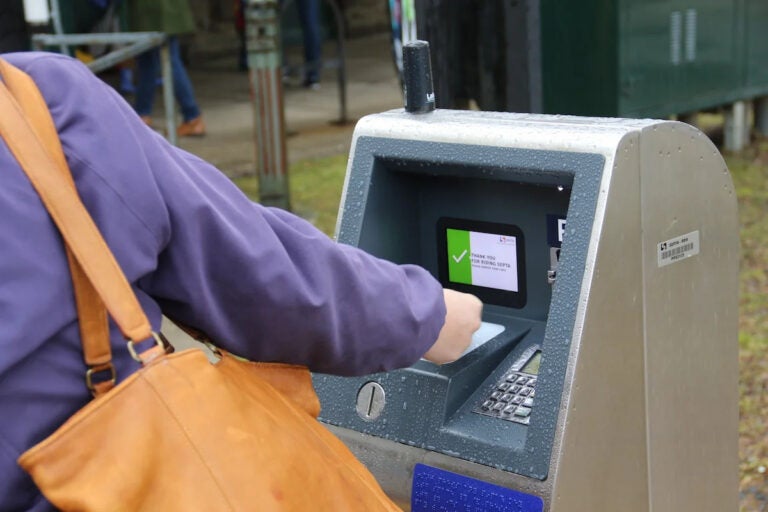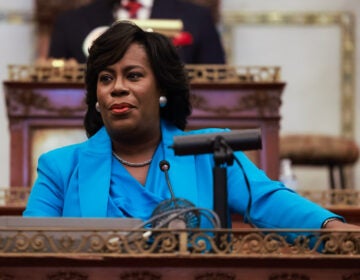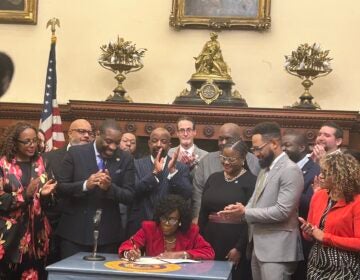Mayor Cherelle Parker wants to keep a popular city worker commuter benefit — but earmarked less money for it
The commuter benefit gives eligibility to around 22,000 city workers, but it’s unclear whether the city will be able to spend less for the same program this year.
Listen 1:03
File - A transit user taps their SEPTA Key card. (Cory Sharber/WHYY)
Have a question about Philly’s neighborhoods or the systems that shape them? PlanPhilly reporters want to hear from you! Ask us a question or send us a story idea you think we should cover.
Philadelphia Mayor Cherelle Parker’s administration hopes to broker a deal with SEPTA to keep its popular city worker commuter benefits program going, but for nearly half the cost.
Parker allocated $5 million for the program for fiscal year 2026, compared to $9 million per year committed by former Mayor Jim Kenney.
Since September 2023, eligible city workers have been able to get free transit passes through the SEPTA Key Advantage program. At the time, Kenney described it as a pilot program to improve hiring and retention among city workers.
About 22,000 city workers have been eligible for the benefit, and roughly 15,000 city employees use the free transit passes.
On average, city workers using the free passes take around 330,000 trips monthly, according to SEPTA. About 78% of these trips are on subways, trolleys and buses, while 22% are on Regional Rail.
City worker requirements
Philadelphia city workers are required to live within city limits and commute to the office five days a week; in July 2024, the Parker administration required all city workers to return to the office instead of working on a hybrid work schedule implemented under the Kenney administration.
The commuter benefit program being at risk was not expected by the American Federation of State, County and Municipal Employees Union (AFSCME) District Council 47, which represents about 3,700 administrative, professional and technical assistance workers in the city.
“We didn’t see this one coming, there was no conversation. No heads up,” said April Gigetts, president of AFSCME District Council 47. “But yes, absolutely I’ll be talking about this as a contract demand moving forward.”
The union had negotiated a one-year extension and is working on a longer contract now, Gigetts said. Free transit passes will be discussed in contract negotiations, Gigetts said.
If the benefits are cut, it would be disappointing, she said.
The SEPTA Key Advantage program allows employers to offer organization-wide commuter benefits. Employers in Philadelphia with at least 50 employees must offer a commuter benefit to workers by city law, but it’s not required to be free of charge; it can be a pre-tax payroll deduction.
Budget hearings
Philadelphia City Council members have been pushing for answers about the proposed budget during hearings over the past two weeks.
On April 1, Camille Duchaussee, the city’s chief administrative officer, responded to questions from council members, saying she expects the program to continue.
“Right now we are still in conversations with SEPTA. The funding again, I think, is commensurate with our need,” she said. “We will continue to provide this very, very necessary benefit, very worthwhile benefit, to all of our workforce.”
A spokesperson for the city responded to questions from WHYY News about the program, saying the city is “proposing to rationalize the contract through a renegotiation” and noted that the passes are a tiny slice of the overall commitment to the transit agency.
Parker’s budget proposes $135 million in fiscal year 2026 as a subsidy for SEPTA, in addition to $9 million in capital.
Mike Carroll, deputy managing director for transportation and infrastructure, said he’s confident that puts the city in a good negotiating position.
“We’re very confident that our investment in SEPTA, represented in both the operating and subsidy and the capital subsidy, is putting our foot forward in doing more for SEPTA than any other jurisdiction,” Carroll said.

Subscribe to PlanPhilly
WHYY is your source for fact-based, in-depth journalism and information. As a nonprofit organization, we rely on financial support from readers like you. Please give today.








